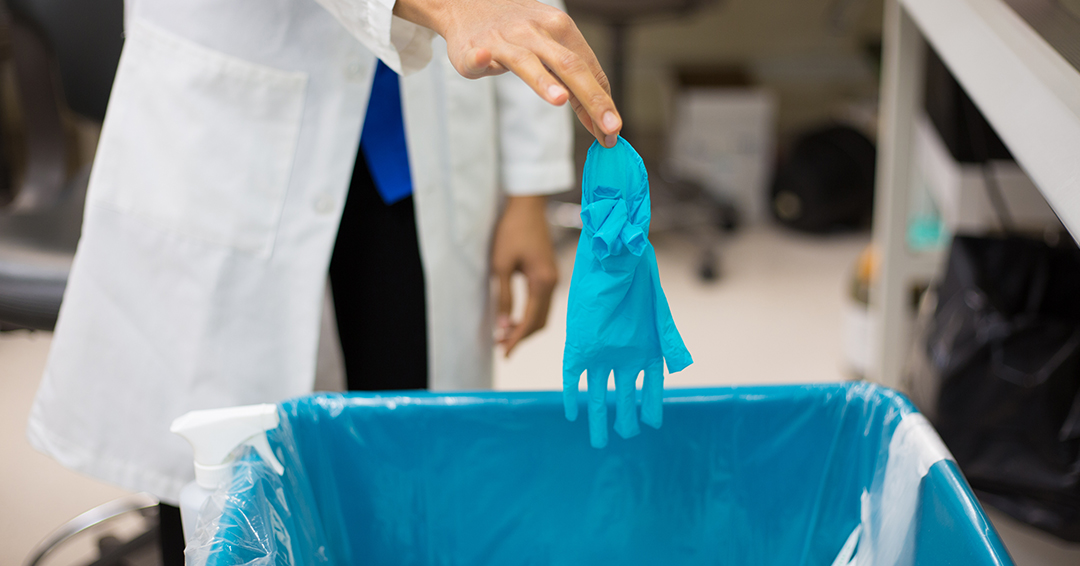
“If healthcare were a country, it would be the fifth-largest polluter in the world,” explains Lara Richer, MDCM, Assistant Professor in the Department of Pathology at McGill University and an attending physician at the McGill University Health Centre (MUHC). “Our line of work impacts climate change, and climate change impacts human health, so in a sense, the sector responsible for keeping us healthy is also contributing to illness.”
The environmental footprint of the healthcare industry is broad, ranging from the energy used to run hospitals and deliver care, to the plastic used to wrapped medical supplies, which is designed to ensure sterility and prevent the spread of disease. “By the time I reached my last year of residency, I had become very uncomfortable by the amount waste being generated and I wanted to do something about it,” explains Dr. Richer.
Dr. Richer decided to start with an item that was literally in the palm of her hands – rubber gloves. At the time, all used gloves were discarded in either the biohazard waste or in the garbage, depending on whether they were soiled or unsoiled. A company called Terracycle was capable of recycling unsoiled gloves, which are cryo-milled into a powdered state and used in a range of applications such as flooring tiles, playground surface covers and athletic fields. In order to establish a recycling program for unsoiled gloves, the team needed to collect them and ensure they changed hands, so to speak.
It was apparent that many gloves were being used in the lab, but just how many remained unclear until McGill Pathology resident at the MUHC, Jonathan Lai, MD, started to scratch the surface. The results were eye popping. From purchasing records, Dr. Lai determined that the anatomical pathology lab where they worked had used 1,371 boxes of gloves in the previous year. “That is almost 350,000 gloves – equivalent in weight to a Toyota Corolla,” explains Dr. Lai. “I was shocked by the number of gloves used in just one section of the pathology lab.” It is somewhat mind-boggling to consider how many gloves must be used across the entire hospital or even across the healthcare network.
Dr. Lai’s data suggested that as much as 30 percent of the gloves were unsoiled, amounting to just under 400 kilograms in weight – equivalent to the weight of a grand piano. “Our target was to collect and recycle about half of the unsoiled gloves.” says Dr. Lai.
The team enlisted the support of the McGill Green Labs Initiative, and together they submitted a proposal to the McGill Sustainability Fund, to cover some of the basic costs like glove collect boxes. Since 2010, the McGill Sustainability Fund has allocated about $10 million in funding and kick-started over 300 projects aimed at building a culture of sustainability on McGill’s campuses.
We were able to purchase 24 glove collection boxes and distribute them around the lab, along with signage that explained what types of gloves could be deposited,” explains Dr. Lai, who then meticulously weighed the boxes monthly to determine when and where the gloves were being deposited. Not only did this allow him to ensure efficiency, but also identify problems and fix them.
“Whenever dips occurred in the number of gloves collected, I was able to intervene, which often involved talking to staff or adjusting the placement of the collection boxes,” explains Dr. Lai. It became clear that the location of boxes was critical. “If it’s not convenient for people, they won’t use them. We needed to make it easy for them to deposit gloves.”
Over the course of the year, the team reached about half their target. “It was a good step forward, but this is only 7.3 percent of the total, so there’s definitely room for improvement,” notes Dr. Lai. “What was particularly encouraging about this project was the attention it generated and the opportunities for collaboration,” says Dr. Richer. While this the glove recycling project continues in the pathology lab, discussions are already under way to expend this work and focus on other items that have become a waste nuisance, such as masks.
